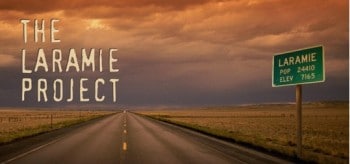The Laramie Project: are we like that?
In October 1998 university student Matthew Shepard was bashed in Laramie, Wyoming, and died in hospital. He was bashed because he was gay. About a month later, residents spoke with Moisés Kaufman and his Tectonic Theatre Company from New York. After more than 200 interviews over 18 months, transcripts were used to create The Laramie Project, which explores the differerent views of what Shepard’s murder meant to locals about their town, and is presented by independent company Mockingbird Productions.

One resident says, “We’re not like that.” A local student says, “We are like that.” Kaufman said, “The experience of working on The Laramie Project has been one of great sadness, great beauty and perhaps, most importantly, great revelation – about our nation, about our ideas, about ourselves.” I feel loathe to infer much about the United States from this script.
The play presents a range of views, including some truly appalling, without much attempt to indicate whether those selected for inclusion are representative of Laramie. In spite of this, the performance stimulated some research that taught me something and despite my reservations, the play is an unsettling, if tangential, success.
The actors perform multiple roles – townsfolk, the Tectonic theatre members conducting interviews, and visitors such as the media – without costume changes and with chairs as the only props. At times the accents took a bit of time to warm up after a character change; however, generally this was done well and the transitions will be smoother as the season proceeds. Hopefully the music will also be refined, as dialogue was sometimes lost in the sound.
Starting with the team’s first round of interviews, the directness of isolated Wyoming towns (they were train refuelling stops) is clear. The head of Theatre at Wyoming University observes that the often disagreeable “redneck” views of Laramie students were readily given, something she preferred to the silence of students bourne of “Puritanism” in North Dakota or Mid-western colleges. Septagenarian long-term resident says “Laramie is live and let live”, as does a third generation resident and police Sergeant. A local gay man in his 40s, takes issue: “I mea
n, basically what it boils down to: If I don’t tell you I’m a fag, you won’t beat the crap out of me.” A local chaffeur says there are no gay bars in Wyoming. Maybe the state is happier to let live things it can’t see?
There is some evidence that Laramie isn’t completely populated by intolerant people. The university’s home coming parade was augmented by a memorial march for Shepard. A gay Laramie resident in his early 50s emotionally recalls watching townsfolk join the memorial as it built to around 500, a number larger than the parade. Shepard’s funeral filled two churches and hundreds overflowed into a nearby park. I don’t know if this was a cross-section of Laramie’s 26,000-odd population or just students. The former may mean that the whole town is not irredeemably intolerant, but how are we to judge this from the accounts of a few individuals?
Shepard was openly gay and involved in campus activism, but his friends say he was naive to the nature of his adopted town, with its significant divide between his educated circle and those struggling in minimum wage jobs.
As a rancher in his 50s reports hearing that Shepard made a pass at his assailants, he apportions blame for the bashing with “maybe it’s fifty-fifty”. True or not, this is the defense used by the young Mormon man directly responsible for Shepard’s injuries.
The play gives more insight into the nature of Laramie when it reports the comments of community leaders. A leader of the Mormon Church offered the proclamation that a family is defined as one woman and one man and children – no leniency. While the local Catholic priest and Unitarian church minister were ready supporters of a vigil for Shepard – seeing that a reminder of Christian values is an appropriate rebuttal to hatred – but the town’s conservative ministers refused to participate and the Republican Governor urged against overreacting in a way that gives one group ‘special rights over others’.
Shepard’s murder became an international story, but by the end of the play I’m not sure that using views of local people chosen to make dramatic moments gave me a good understanding of the forces that make the people of Laramie as they are, much less the people of the US.
Despite this misgiving, the play did cause me to wonder about attitudes in Australia and it’s easy to find information online. For example, 74% of same-sex-attracted students reported suffering abuse at school. This increased to 89% for 14–17 year olds (www.humanrights.gov.au). I think this type of information gives a better basis to argue with, but I am not convinced that the worst of us speaks for all of us.
